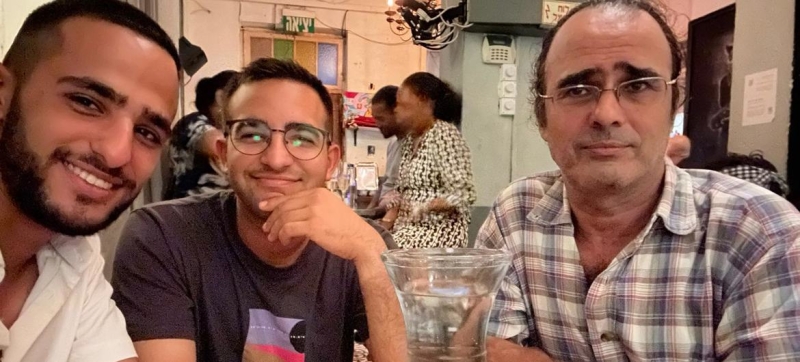- 2025: Resilient Economies, Smart Development, and More Jobs |
- Dhaka rejects India's statement on incident at BD HC residence, New Delhi |
- Stocks end lower; trading falls at DSE, improves at CSE |
- No need to be kind to election disruptors: EC to law enforcers |
- No Media Faced Arson Attacks in 53 Years: Mahfuz Anam |
Father of Gaza Hostage Urges End to War, Backs Two-State Solution

Yehuda Cohen (right) with his sons, Nimrod (left) and Yotam (centre), before 7 October 2023.
Two years after his son was taken hostage during the Hamas-led terror attacks, Yehuda Cohen continues to fight tirelessly for his son’s release — and for a lasting political solution to the Israel-Palestine conflict.
On 7 October 2023, Corporal Nimrod Cohen was guarding an area near the Nirim kibbutz, close to the Gaza frontier, when his tank malfunctioned and his unit was overrun by armed militants.
Nimrod was the only one taken alive, and his father has received credible reports — including from hostages who have since been released — that his son is still alive in Gaza, most recently in the Khan Younis area.
“Nimrod is a normal boy,” said Yehuda, speaking to UN News from his home in Rehovot, central Israel.
“We’re not talking about Nimrod because he’s a rock star or a sports star. He’s a normal boy who had the misfortune of doing his duty to his country and serving in the army,” Yehuda said.
The attackers killed more than 1,250 Israelis and foreign nationals. More than 250 others were abducted and taken to Gaza as hostages, including women, children and the elderly.
Survivors and witnesses described rape, sexualised torture, and other forms of cruel and inhumane treatment carried out during the assault.
“The Hamas attack was not intended to release any territories or to help the Palestinian people. It was a heinous attack meant to break the morale of the Israeli people,” Mr. Cohen said.
Following the attack, he, his wife Viki, and son Yotam joined other hostage families urging international leaders to press both Hamas and the Israeli Government to agree on a ceasefire and hostage-release deal.
The Cohen family has met UN Secretary-General António Guterres and other senior UN officials in New York and Geneva. They have also lobbied Member States including France and the United States, as part of the ongoing campaign by families to secure the freedom of their loved ones.
Mr. Cohen said it has been a full-time fight:
“On the streets of Israel — marches, rallies, demonstrations, speeches — through the media, both local and international. Anything, to tell leaders that pressure needs to be applied on both sides,” he said, referring to both the Israeli Government and Hamas.
“I even talk to Palestinians,” he continued, stressing that the release of hostages and ending the war would benefit both Israel and the Middle East as a whole.
He added that Israelis and Palestinians share the same desire to live normal lives — something not reflected in the extremist views of some members of the Israeli Government or of Hamas.
“We want to live normal lives together, and the only way is to reach a settlement between Israel and the Palestinians,” he said. “So in the future, we can say Israel and Palestine — that is the two-State solution. There is no other way.”

